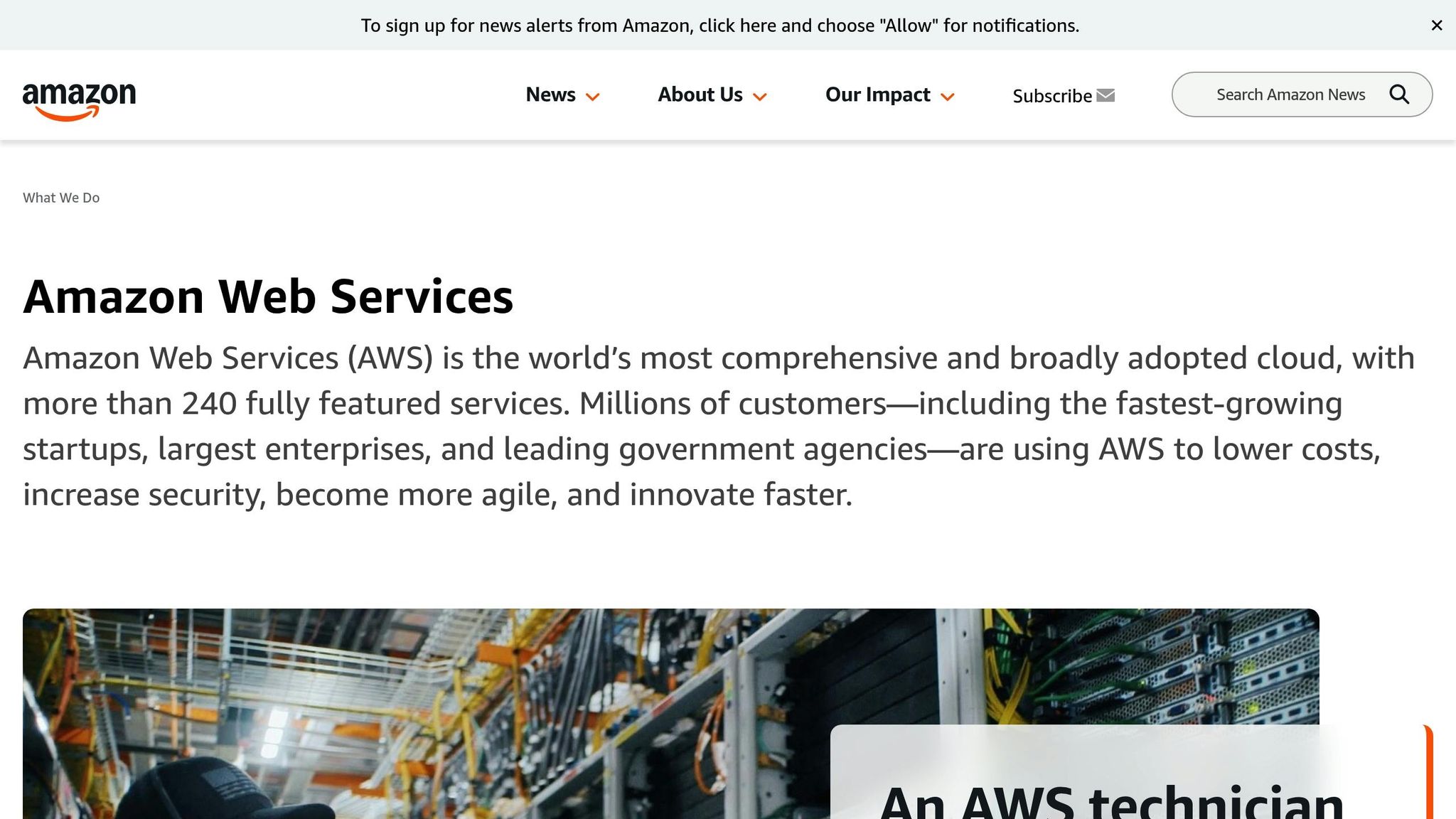Azure vs AWS: Cost Comparison for Small Businesses
Explore the cost benefits of Azure versus AWS for UK small businesses, focusing on savings, integration, and unique local advantages.

Looking for the best cloud platform for your small business? Here's the bottom line:
- Azure is often the better choice for UK small businesses already using Microsoft tools, thanks to savings of up to 85% with the Azure Hybrid Benefit and lower costs for SQL workloads.
- AWS offers more services and customisation options but can be more complex and expensive for certain use cases.
Key Cost Differences:
- Virtual Machines: Azure Bs-series starts at £3/month, while AWS EC2 is often pricier.
- SQL Workloads: Azure SQL Managed Instance costs up to 93% less than AWS RDS.
- Storage: Azure's storage tiers are generally cheaper, especially for long-term and infrequent access data.
- UK Benefits: Azure bills in GBP, has local data centres, and offers free inbound data transfers.
Quick Comparison
| Feature | Azure | AWS |
|---|---|---|
| Pricing Model | Pay-as-you-go, Reserved Instances | Pay-as-you-go, Savings Plans |
| Virtual Machine Costs | From £3/month (Bs-series) | Higher for comparable instances |
| SQL Workload Costs | Up to 93% less than AWS RDS | More expensive for SQL workloads |
| Storage Costs | Lower for archive and infrequent use | Slightly higher |
| UK-Specific Benefits | GBP billing, local data centres | Limited UK-specific options |
| Licence Savings | Up to 85% with Hybrid Benefit | Limited to application servers |
| Long-Term Discounts | Up to 85% with combined benefits | Up to 72% with Savings Plans |
For small businesses, Azure's integration with Microsoft tools, lower costs, and UK-specific benefits often make it the more cost-effective choice. However, AWS may suit businesses needing broader service options or customisation.
AWS vs Azure Hybrid Use Benefit cost comparison

Basic Pricing Structure Comparison
Let's break down Azure and AWS pricing by looking at billing methods, payment options, and factors specific to the UK. These details highlight how the two platforms differ in their payment plans and local pricing strategies.
Time-Based Billing Methods
Both Azure and AWS use pay-as-you-go billing models. Azure simplifies this process through its integration with other Microsoft products, making cost estimation easier. In contrast, AWS's wider range of services can make pricing more complex.
"Cloud has been elevated from a technology disruptor to a business disruptor. IaaS is propelling Software-as-a-Service (SaaS) and Platform-as-a-Service (PaaS) expansion as purchasers keep integrating more applications into the online environment and upgrading current ones." - Sid Nag, VP Analyst at Gartner
Payment Plans and Flexibility
Both platforms provide a variety of payment options tailored to different needs:
| Payment Option | Azure | AWS |
|---|---|---|
| Pay-as-you-go | Standard rates with no commitment | Utility-style billing |
| Long-term commitment | Reserved Instances | Savings Plans |
| Interruptible workloads | Spot VMs (up to 90% off) | Spot Instances (up to 90% off) |
| Existing licence benefits | Hybrid Benefit (up to 85% savings) | Not available |
For example, a UK credit union cut costs by 30% by moving from pay-as-you-go to Reserved Instances in Azure. Another financial services provider saved £100,000 annually by using Azure's cold storage for archiving customer records.
UK Market Pricing
Azure offers several UK-specific benefits, such as billing in GBP and local data centres that meet data protection regulations. According to the Cloud Migration Cost Calculator for Banks, UK businesses switching to Azure from AWS reduced cloud costs by 20–40%.
Azure is particularly advantageous for organisations already using Microsoft products. For instance, a banking firm cut cloud costs by 40% using Azure Hybrid Benefits, which leverage existing Windows licences. Additionally, Azure's integrated security features have helped financial institutions lower security-related expenses by 30%, compared to AWS's separately priced security tools.
Data transfer costs are another key factor. AWS's higher inter-service transfer fees led to a 20% increase in one bank's monthly bill. Azure, with its free inbound transfers and more favourable data transfer rates, is better suited for data-heavy small businesses, further highlighting its cost advantages.
Money-Saving Options for Small Businesses
Licence Benefits Comparison
Azure offers a clear advantage for small businesses already using Microsoft products. Through the Azure Hybrid Benefit programme, businesses can apply existing Windows Server and SQL Server licences with Software Assurance to reduce Azure compute costs by as much as 40–50%. In comparison, AWS's License Mobility mainly supports application servers and doesn't include Windows Server licences.
When it comes to SQL workloads, Azure provides a more economical solution. Azure SQL Managed Instance delivers up to five times faster performance while costing 93% less than AWS RDS. This cost advantage is further supported by Azure's built-in compatibility with Microsoft tools.
Integration with Microsoft Tools
Azure's integration with Microsoft 365 and Azure Active Directory simplifies operations and reduces training and administrative costs.
"Our organisation is safer because each Microsoft solution offers a different layer of security, and the solutions work together natively to deliver coordinated detection and response across our environment." - Sachin Vinay, Network Administrator, Amrita Vishwa Vidyapeetham
This ease of use extends to security management. Jonathan Hunkapiller, Director of Engineering Infrastructure at Amesite Inc., highlights this benefit:
"Azure made it really simple to implement security. I've used AWS and other clouds, and it's always complex to turn it on. Microsoft made it very simple".
These integration features not only enhance security but also contribute to cost savings over time, particularly when paired with Azure's discount programmes.
Long-term Commitment Discounts
Both Azure and AWS offer discounts for long-term commitments, but their approaches differ:
| Commitment Type | Azure | AWS | Maximum Savings |
|---|---|---|---|
| Reserved Instances | 1- or 3-year terms, monthly or upfront payment | 1- or 3-year terms, flexible payment options | Up to 72% |
| Savings Plans | Applies regardless of instance details | Compute and EC2 plans with varying flexibility | Azure: Up to 65%, AWS: Up to 72% |
| Spot Computing | User-defined maximum price | Dynamic supply/demand pricing | Up to 90% |
Azure often proves more cost-effective for small businesses, especially when combining benefits. For example, pairing the Azure Hybrid Benefit with Reserved VM Instances can lead to savings of up to 85% compared to standard pay-as-you-go rates. Additionally, Azure provides flexibility with cancellation policies, allowing businesses to cancel up to £39,000 annually per billing profile.
To make the most of Azure's cost-saving options, small businesses should:
- Take a detailed inventory of licences before migrating to ensure eligibility for the Azure Hybrid Benefit.
- Use Azure Cost Management tools to monitor spending and track savings.
- Regularly review licence usage to avoid over-licensing or under-utilisation.
Small Business Usage Examples
Website and App Hosting Costs
Both Azure and AWS operate data centres in the UK, with Azure offering an additional facility in Cardiff for improved regional data resilience. For businesses already using Microsoft tools, Azure App Service integrates seamlessly, while AWS Lightsail offers a budget-friendly hosting option. Azure's pricing for similar services is aligned with AWS.
Data Storage Price Comparison
Storage costs are a key factor in cloud expenses, influenced by how much data you store, how often you access it, and the storage tier you choose. Azure uses a tiered storage model to match costs to specific data needs.
| Storage Tier | Azure Approx. Cost (per GB) | AWS Approx. Cost (per GB) | Best For |
|---|---|---|---|
| Hot / Standard | From £0.014 | From £0.018 | Frequently accessed data |
| Cool / Infrequent Access | From £0.008 | From £0.010 | Infrequently accessed data |
| Archive / Long-term | From £0.0016 | Around £0.002* | Long-term data retention |
*AWS archival pricing (e.g., AWS Glacier) may vary depending on specific services and usage.
Azure also offers Storage Reserved Capacity, which allows businesses to save more by committing to longer-term storage plans.
To keep storage costs in check:
- Regularly monitor how your storage is being used.
- Automate tier changes for older or less-used data.
- Compress files to reduce their size.
- Reassess reserved capacity commitments annually.
These strategies, combined with the pricing differences, highlight potential savings, especially for organisations already using Microsoft-based solutions.
Best Choice for UK Small Businesses
For UK small businesses that rely on Microsoft products, Azure offers considerable savings. With the Hybrid Benefit, businesses can save up to 85% on Windows Server and SQL Server workloads.
Azure also stands out for its database performance and cost efficiency. Here's how it compares:
| Workload Type | Performance Improvement | Cost Reduction |
|---|---|---|
| Azure SQL Managed Instance vs AWS RDS | Up to 5x faster | Up to 93% less costly |
| SQL Server on Azure VMs vs AWS EC2 | Up to 57% faster | Up to 54% less costly |
Azure's support pricing further helps reduce expenses. Developer support starts at about £23 per month, and the Standard support tier is available for around £80 per month per user. These fixed-rate options often provide better value compared to AWS's percentage-based Business support model.
Other cost-saving features include:
- Price matching: Azure matches AWS instance pricing within 90 days.
- Spot VM discounts: Save up to 90% on flexible workloads.
- Reserved capacity: Commitments over time can lead to savings of up to 80%.
- Seamless integration: Built-in compatibility with Microsoft 365 and Azure Active Directory reduces operational costs.
For businesses already invested in Microsoft tools, Azure offers a practical and cost-effective solution. However, analysing your specific workloads is still essential to determine the best fit.
FAQs
How can the Azure Hybrid Benefit help small businesses in the UK lower their cloud costs?
The Azure Hybrid Benefit offers UK small businesses a cost-effective way to maximise their existing investments. By reusing on-premises Windows Server licences, businesses can save up to 40% on virtual machine costs. Additionally, it enables savings of up to 55% on SQL Server Integration Services, making it an excellent choice for reducing expenses while transitioning to the cloud.
This benefit is particularly valuable for small businesses aiming to optimise their budgets without compromising on performance or scalability.
What makes Azure's storage solutions a great choice for long-term data retention for small businesses?
Azure offers cost-effective and secure storage options tailored for long-term data retention, making it ideal for small businesses. With features like tiered storage, you can optimise costs by automatically moving infrequently accessed data to lower-cost tiers, such as Azure Blob Storage's Cool or Archive tiers. This ensures you only pay for what you need without compromising data availability when required.
Additionally, Azure provides advanced data protection and compliance tools, ensuring your data meets UK regulatory standards. Its global redundancy options also mean your data is secure and accessible across multiple regions, offering peace of mind for small businesses managing critical information.
Why might a small business choose Azure for highly customisable cloud solutions?
Azure is an excellent choice for small businesses that require extensive customisation in their cloud solutions. It offers a wide range of flexible tools and services, allowing businesses to tailor their infrastructure to specific needs. From virtual machines to advanced database management, Azure provides scalable options that can adapt as your business grows.
Additionally, Azure integrates seamlessly with other Microsoft products like Office 365 and Dynamics, which are widely used by businesses in the UK. This compatibility can streamline operations and improve efficiency, making Azure a practical and cost-effective solution for small businesses seeking customisation and scalability.




